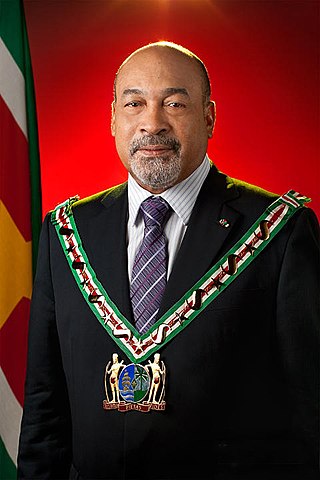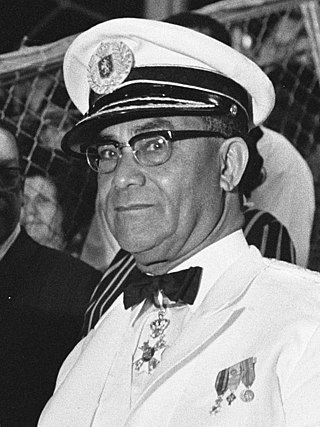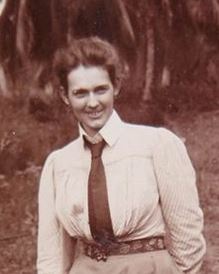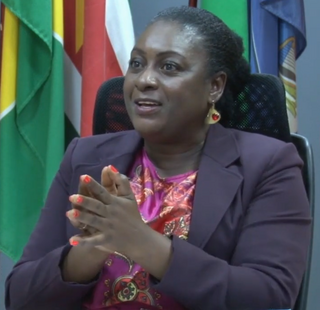
Suriname, officially the Republic of Suriname, is a country in northern South America, sometimes considered part of the Caribbean and the West Indies. Situated slightly north of the equator, over 90% of its territory is covered by rainforests, the highest proportion of forest cover in the world. Suriname is bordered by the Atlantic Ocean to the north, French Guiana to the east, Guyana to the west, and Brazil to the south. It is the smallest country in South America by both population and territory, with around 612,985 inhabitants in an area of approximately 163,820 square kilometers. The capital and largest city is Paramaribo, which is home to roughly half the population.

This is a demography of the population of Suriname, including population density, ethnicity, education level, health of the populace, economic status, religious affiliations, and other aspects of the population.
The early history of Suriname dates from 3000 BCE when Native Americans first inhabited the area. The Dutch acquired Suriname from the English, and European settlement in any numbers dates from the 17th century, when it was a plantation colony utilizing slavery for sugar cultivation. With abolition in the late 19th century, planters sought labor from China, Madeira, India, and Indonesia, which was also colonized by the Dutch. Dutch is Suriname's official language. Owing to its diverse population, it has also developed a creole language, Sranan Tongo.

Desiré Delano Bouterse is a Surinamese military officer, politician, convicted murderer and drug trafficker who served as President of Suriname from 2010 to 2020. From 1980 to 1987, he was Suriname's de facto leader after conducting a military coup and establishing a period of military rule. In 1987, Bouterse founded the National Democratic Party (NDP). On 25 May 2010, Bouterse's political alliance, the Megacombinatie, which included the NDP, won the parliamentary elections, and on 19 July 2010, Bouterse was elected as President of Suriname with 36 of 50 parliament votes. He was inaugurated on 12 August 2010.
Síle de Valera is an Irish former Fianna Fáil politician who served as Minister of State for Adult Education, Youth Affairs and Educational Disadvantage and Minister for Arts, Heritage, Gaeltacht and the Islands from 1997 to 2002. She served as a Teachta Dála (TD) from 1977 to 1981 and from 1987 to 2007. She was a Member of the European Parliament (MEP) for the Dublin constituency from 1979 to 1984.
The Kwinti are a Maroon people, descendants of runaway African slaves, living in the forested interior of Suriname on the bank of the Coppename River, and the eponymous term for their language, which has fewer than 300 speakers. Their language is an English-based creole with Dutch, Portuguese and other influences. It is similar to the languages spoken by the Aluku and Paramaccan Maroons, and split from Sranan Tongo in the middle 18th century. The Kwinti had a population of about 300 in 2014 and adhere to the Moravian Church.

Anton de Kom University is the only university in Suriname. It is located in the capital, Paramaribo, and named for Anton de Kom, an anti-colonialist activist who was killed by the Nazis while in exile in the Netherlands.

Johan Henri Eliza Ferrier was a Surinamese politician who served as the 1st president of Suriname from 1975 to 1980. He was also the country's last governor-general before independence, serving from 1968 to 1975, before becoming the first president upon independence from the Netherlands in 1975.

Cynthia Henri McLeod is a Surinamese novelist known for her historic novels and whose debut novel instantly made her one of the most prominent authors of Suriname.

Jagernath Lachmon, also Jaggernath Lachmon, was a Surinamese politician. He was one of the founders of the Progressive Reform Party (VHP), an Indo-Surinamese party founded in 1947 of which he served as President until his death.

Afro-Surinamese are the inhabitants of Suriname of mostly West African and Central African ancestry. They are descended from enslaved Africans brought to work on sugar plantations. Many of them escaped the plantations and formed independent settlements together, becoming known as Maroons and Bushinengue. They maintained vestiges of African culture and language. They are usually split into two ethnic subgroups.

Chandrikapersad "Chan" Santokhi is a Surinamese politician and former police officer who is the 9th president of Suriname, since 2020. After winning the 2020 elections, Santokhi was the sole nominee for president of Suriname. On 13 July, Santokhi was elected president by acclamation in an uncontested election. He was inaugurated on 16 July.

Women in Suriname are women who were born in, live in, or are from Suriname. Surinamese women may be ethnically East Indian, Creole/Afro-Surinamese, Javanese, Amerindian, Mixed, or of other ancestry. Many women of Suriname work in the informal sector and in subsistence agriculture.

William Soemita was a Surinamese parliamentarian and minister. He was the only Deputy Vice President of Suriname, serving from 1988 to 1990.

Philomena Bijlhout is a Surinamese-born Dutch former politician and television presenter.

Gregory Allan Rusland is a Surinamese politician. He served as Minister for Natural Resources between 2005 and 2010. In 2012 he became leader of the National Party of Suriname. Rusland has been a member of the National Assembly since 2015.

Jennifer Victorine van Dijk-Silos is a Surinamese politician of the National Democratic Party. She was Minister of Justice and Police between August 2015 and March 2017. Van Dijk-Silos served as chair of the Onafhankelijk Kiesbureau between 2004 and 2015 and once more from 2018 to 2020.

Grace Schneiders-Howard was a Surinamese social worker and politician. Initially beginning her career in civil service as an agent for immigrant workers, she later worked in the Hygiene Department to develop sanitation services in the country. When women were allowed to run for office, but without the right to vote, she ran as a candidate for the Estates of Suriname. Elected in 1938, she became the first woman to serve in the Surinamese legislature. A controversial and abrasive figure, Schneiders-Howard was convinced of her own racial and social superiority, using her work with migrants and the poor to propel her own aims and views of how society should be organized. A pioneer woman in many fields, she was condemned by her opponents, who questioned her morals, her motivations and even her sanity. Her lasting impact was upon bringing improved sanitation of the country.

Lygia Louise Irene Kraag-Keteldijk is a Surinamese politician who served as Minister of Foreign Affairs in the cabinet of President Venetiaan between 2005 and 2010.

Saskia Natacia Walden is a Surinamese accountant and educator. She served as Minister of Economic Affairs from 16 July 2020 to 18 April 2022.

















